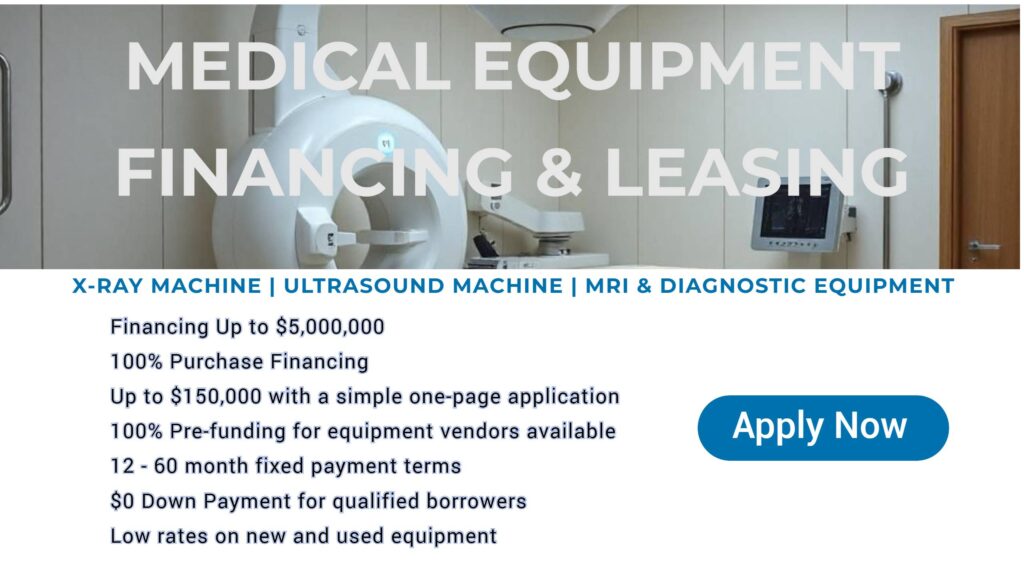Understanding MRI Equipment and Industry
Financing MRI equipment is a significant investment for many medical facilities and mobile diagnostic businesses. Understanding the costs, financing options, and potential revenue from charging clients and insurance companies is crucial for making informed decisions. With careful planning and consideration of the specific needs of their practice or business, medical professionals can effectively finance and utilize MRI technology to enhance patient care.
Here’s an overview of the Types of Businesses That Finance MRI Equipment
Professional Clinics
Specialized Diagnostic Clinics: Centers focused on specific types of diagnostics, including imaging centers.
Outpatient Clinics: Offer a variety of medical services outside a hospital setting, often including imaging services.
Hospitals and Diagnostic Centers
Private Hospitals: These facilities often require advanced imaging technology to provide comprehensive care and to stay competitive.
Public Hospitals: Funded through government grants or bonds, they may also finance MRI machines to upgrade their diagnostic capabilities.
Physician Practices
Radiology Practices: Specialize in diagnostic imaging services and require MRI machines as a fundamental part of their practice.
Multi-Specialty Groups: Practices offering diverse medical services, including diagnostics, may finance MRI equipment for comprehensive patient care.
Mobile Diagnostic Businesses
Mobile MRI Units: Businesses that operate MRI machines mounted inside trailers, providing services to various locations, including rural areas, prisons, and small clinics that cannot afford stationary MRI units.
Average Cost of MRI Equipment
Fixed MRI Machines
New MRI Machines: Typically range from $1 million to $3 million, depending on the strength of the magnet (measured in Tesla) and the technology features.
Used MRI Machines: Can cost between $150,000 and $700,000, depending on age, condition, and capabilities.
Mobile MRI Units
New Mobile MRI Trailers: Generally cost between $1.5 million and $3 million.
Used Mobile MRI Units: Can range from $200,000 to $1.5 million.
Cost for Physicians or Doctors to Charge Clients and Insurance
MRI Scans
Out-of-Pocket Costs for Patients: Typically range from $400 to $5,000, varying by location, type of scan, and facility.
Insurance Reimbursements: Depend on the insurance provider, the patient’s policy, and negotiated rates. Reimbursements typically range from $500 to $2,000 per scan.
Mobile MRI Diagnostic Business Use
Advantages of Mobile MRI Units
Flexibility: Ability to serve multiple locations, providing access to high-quality imaging in underserved areas.
Cost-Effective: Eliminates the need for multiple fixed MRI installations, reducing overall costs.
Convenience: Patients can receive MRI services close to home or at their physician’s office without traveling to a hospital.
Operational Considerations
Logistics: Coordinating schedules, transport, and setup at various locations.
Maintenance: Regular servicing and upkeep of both the MRI machine and the trailer.
Staffing: Ensuring qualified technologists and radiologists are available to operate the machine and interpret the results.
Considerations for Financing MRI Equipment
Leasing vs. Financing
Leasing: Lower initial costs, ability to upgrade to newer technology, and tax benefits. Leasing companies may offer flexible terms.
Buying: Higher initial costs but ownership of the asset, potential for better long-term savings, and possible depreciation benefits.
Loans and Financing Option
Bank Loans: Traditional financing through banks with competitive interest rates and terms.
Equipment Financing Companies: Specialize in medical equipment loans, offering tailored financing solutions.
Vendor Financing: Many MRI manufacturers offer in-house financing options to make purchasing their equipment more accessible.
Understanding Equipment Lease Agreements
Carefully review the lease agreement before signing is critical make sure you’re not signing an FMV Lease when the salesperson says dollar buyout. Key components to check include:
· Payment Terms: Understand the monthly payment amount and due dates.
· Maintenance and Repairs: Determine who is responsible for maintenance and repairs.
· End-of-Lease Options: Know your options at the end of the lease, such as purchasing the equipment, renewing the lease, or returning the equipment.
· Early Termination: Be aware of any penalties for early termination of the lease.
· Advance Payment: First and Last, security deposit or down payment might be required. Check your equipment lease agreement to make sure you are aware of any money upfront to consummate the lease financing agreement.
Budgeting for Financing
Initial Costs: Some leases require a down payment or initial fees. Factor these into your budget.
Monthly Payments: Ensure your cash flow can comfortably cover the monthly lease payments.
Additional Costs: Insurance, delivery, sales tax and other additional warranty or services that might be included in the equipment financing purchase.
End-of-Lease Considerations
As the end of your lease term approaches typically within 6 months, you must inform the lessor that the lessee is intending to keep the equipment or do the following options:
Purchase: If you’re satisfied with the equipment and it meets your long-term needs, consider purchasing it.
Renew Lease: If the equipment is still in good condition and meets your needs, you may choose to renew the lease.
Upgrade: If newer, more efficient models are available, consider financing the latest equipment.
Sell the equipment and payoff the lender
· Lower Initial Costs: Financing reduces the need for large upfront capital outlays.
· Cash Flow Management: Helps maintain cash flow by spreading costs over time.
· Access to Up-to-Date Equipment: Allows you to upgrade to the latest equipment more frequently.
· Tax Advantages: Lease payments may be tax-deductible as operational expenses.
· Compare Terms: Examine the terms and conditions of multiple financing companies.
· Lease Financing Term duration between 3 to 5 years.
· Monthly payments with very little upfront capital outlay
· Interest rates ranges based on personal credit whether or established restaurants.
· End-of-lease options- lease to own or MRI Equipment Finance Agreement where you own it outright.
Equipment financing is vital for businesses that need expensive equipment to operate efficiently. Companies in construction, manufacturing, healthcare, and other heavy equipment-intensive industries benefit significantly from these financial solutions. Understanding the options and working with top financing companies can help businesses acquire necessary equipment while managing cash flow effectively.

